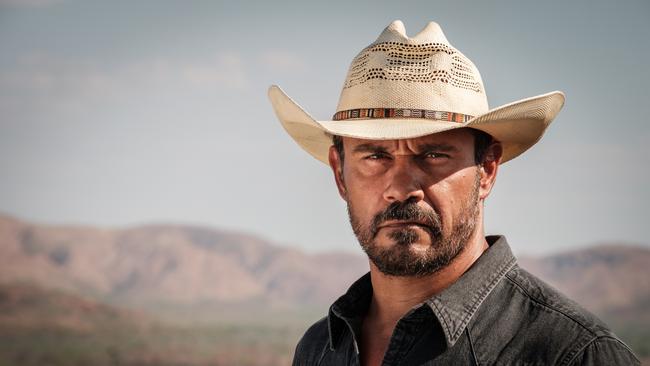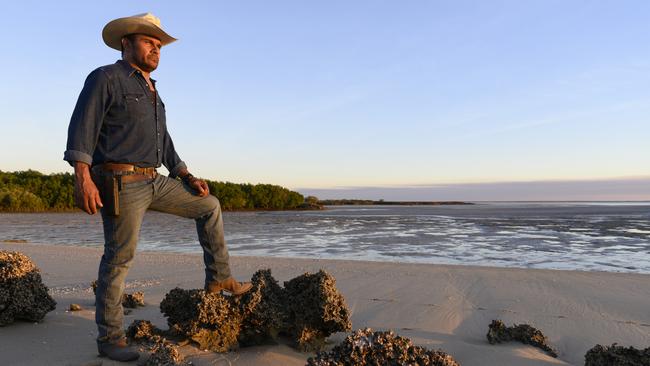Darker forces at play in second season of Mystery Road
Some new characters and welcome returns arrive in the second season of this modern-day Australian western.

I am sure I’m not the only one delighted to welcome back Bunya Productions’ Mystery Road for a second season after a hugely successful award-winning first run at home, and then garnering fine reviews after being streamed in both the UK, US and around Europe. Unfortunately for its lead actor, Aaron Pedersen, one of our finest, they tended to focus on the more internationally famous Judy Davis, his sidekick in the first series as smart, local cop Emma James, an expert shot with her service weapon and fond of wearing oversize dark sunglasses. “Judy Davis Goes West” headlined Mike Hale’s favourable review in the New York Times.
Having worked with Pedersen, I can imagine him smiling that slightly crooked smile, shrugging his shoulders and wishing her luck.
The new series, set in and around Western Australia’s Dampier Peninsula where the red dust of the pindan desert meets the white sand beaches, is directed by the also internationally celebrated, award-winning directors Warwick Thornton (Sweet Country, Samson & Delilah) and Wayne Blair (Top End Wedding). The ensemble cast features some terrific talent including Gary Sweet, Callan Mulvey, Rob Collins, Joel Jackson and Ursula Yovich. And they are complemented by the presence of the accomplished Swedish actress Sofia Helin, star of The Bridge, the brilliant Scandi-noir police procedural overlaid so stylistically with the escapist thriller.
In Mystery Road she has swapped the olive-green Porsche she drove as detective Saga Noren, the brown leather trousers and the iconic long flowing khaki military coat for a pair of outsized black spectacles and a sun hat, as she plays Swedish archaeologist Professor Sandra Elmquist.
Told largely through the eyes of Pedersen’s Jay Swan, the new series again presents ideas and themes not uncommon in this kind of police procedural but it’s set apart by what producers Greer Simpkin and David Jowsey call its “brew of tropic gothic outback noir”. And again it’s enjoyably entertaining in the way Thornton, who directs the first episode, and his collaborators quickly lull us into a believable kind of excitement, invoking a kind of temporary sense of fear for and uncertainty about the fate of an original local character in detective Jay Swan we care about.
The series’ obvious indebtedness to the formulaic structures of the classic western are maintained under Thornton’s direction, the elements of the formula again deployed to develop a sense of the outback as a symbolic landscape. The bare and silent outback is unforgiving and distant, and against it the protagonists of Mystery Road must attempt to work out their destinies. It’s a landscape as Randolph Stow suggested in his novel, Tourmaline, that in the early mornings gives off the tint of blood in water but by late afternoon when, “every pebble glares, wounding the eyes, shortening the breath”, the practice of living “is hardest to defend, and nothing seems easier than to cease, to become a stone, hot and still”.
And Pedersen’s Swan at times is stone-like, monumental, often caught by Thornton’s camera framed against outcrops of burnt clay, spreads of mulga bush or squinting into the red wind, reduced to the most primary of sentiments. (The series uses the landscape almost as another character as if to recognise the insubstantiality of European occupation.) At these times, he closely resembles Leone’s Man With No Name, and the supreme detachment and coolness of his heroes, Clint Eastwood and Lee Van Cleef, the musical notes hauntingly at times resembling those of Ennio Morricone.
Swan is obviously sensitive to nuance even as he affects that wise-guy coolness — but there’s also a bitterness, exasperation and loneliness behind the veneer of taut self-control, sarcasm and seeming indifference.
He’s always distrusted by white officials, though it’s of little concern to him, and it’s obvious he has a profound disbelief in the conventional agencies of law and justice.
His only objective is to maintain his individual identity — at times hard to hang on to — civilisation an ambiguous blessing. “Are you a police officer?” Sandra, Helin’s archaeologist, asks when they first meet. “It depends what you think a real police officer is,” he replies. It’s a particularly nice scene when you remember what kind of a cop Helin was as the stubborn, emotionally vulnerable Saga, one of TV’s great detectives, with her abrupt yes-no answers, emotional candour and the repetitive Asperger’s-style intensity.
Thornton’s direction continues the style set by Perkins; nothing too flashy, just that sense of foreboding from the start as in a nice pre-titles montage we follow a small white truck as it hurtles through rugged countryside, and a fishing boat abruptly cuts through a mangrove swamp.

Again the series features some lovely time-lapse photography by Murray Fredericks, a feature of the first series. Thornton is also director of photography and maintains the look established both in Ivan Sen’s movies and by celebrated cinematographer Mark Wareham in the first TV series, moody with a colour palette taken from the Kimberly scenery.
The truck stops and Swan appears wearing the same whitish fedora hat pulled low over his forehead. It turns out the occupant of the boat is a crab fisherman who has pulled from the water a headless corpse now covered in a blue tarpaulin. (A later medical examination finds a handful of pills stuffed down his throat; his name is Clarrie Stewart, a small-time drug dealer.)
A young constable appears from the darkness, Fran Davis, played with wit and a kind of laconic energy by Jada Albert, and explains to the taciturn detective that the body could have come from anywhere given the night’s high tide. Was the deceased drunk and fell overboard, decapitated by the motor’s propeller? But already Swan senses dark forces. “Sometimes it’s a murder; sometimes it’s not a murder,” he says. “This looks like a message — revenge, love, drugs.”
He’s not like other cops, observes young constable Fran, who becomes his new sidekick, replacing Judy Davis, right from the start. They are offered crabs by the fisherman who discovered the body in the water. She takes a hessian bag full for her family. He refuses. “You must be the first black law I’ve met who doesn’t like crabs,” she says.
Swan is soon in the local town, a rundown place called Gideon, “The Pearl of the North”, a place sporting a sense of derelict independence. The township seems to be modelled on Broome (where I once spent six months doing a kid’s TV series for the BBC), still a furtive town often stranger than fiction. And, like Broome, Gideon’s streets are flanked by dense gardens thriving in the red soil, and you can almost feel the hot air thick with the scent of frangipani and brooding, as ancient Cycads hover menacingly in dark precincts; a town with its windows remorselessly latticed against the sun and frequent cyclones.
The senior local cop is Owen, played tidily by Mark Mitchinson, a burly, bearded, indifferent man nearing retirement, longing to be out on the open sea in his suspiciously new and luxurious cruiser called “The Office”, which he spends every spare moment washing and polishing. “Any theories, Owen,” Jay asks. “Not at this stage,” he answers. “At what stage you think you’ll have some?” snaps the detective.
Told there is no drug trade in the settlement, Fran contradicts her boss, telling Jay of big business in narcotics that decimated Gideon a year ago, ice moving through the town busting up families. Then it mysteriously flipped after a meth lab was raided out bush, “like someone flipped a switch”.
Stewart’s estranged wife leads Swan to the Westside Trucking Company and one of its workers, a thug called Dylan (Fletcher Humphries), a whiz on the dirt bike, leading Swan on a merry chase through the scrub. A parallel plot joins at this point as the local indigenous community protests an archaeological dig being conducted by Helin’s archaeologist, which becomes more complex when she uncovers a bag full of human remains.
Swan’s investigation is hampered from the start by the presence in town of his estranged wife, Mary, played again with lovely acidity by Tasma Walton, now involved with a former cop linked to the town, fingers in a few suspicious goings-on.
As was the case in the early series, the first hour establishes some persuasive characters, maintains the compelling style of the original, and carries the certainty that Swan, wired like a motor, will let nothing stand in his approach as the detective uncovers the truth behind the headless body floating in the mangroves and a dusty bag full of human remains.
Mystery Road 2, Sunday, ABC, 8.30pm
READ MORE: David Stratton reveals his top picks on Netflix | Our next guilty TV pleasure


To join the conversation, please log in. Don't have an account? Register
Join the conversation, you are commenting as Logout